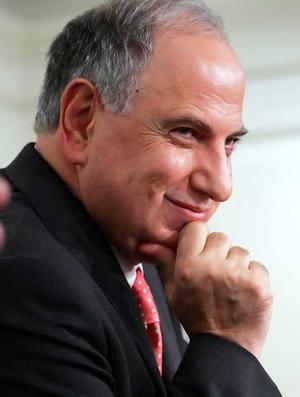"Wallowing in his narcissism, victory to him means only one thing: his own political survival." That phrase appeared under the byline of Ahmad Chalabi in 1991, on the op-ed page of The Washington Post. He had fled Jordan while under criminal investigation, and was getting his political career going, even as the embezzlement case against him for massive bank fraud was under way.
He was referring to Saddam Hussein in that 1991 article, but of course Chalabi's own political survival, then and now, has been a stunning accomplishment. Now he thrives because Iran and its Revolutionary Guards, old allies of his, find him useful.
His most recent victory has been to establish relevance from nothing. First, he made himself something of a force in the upcoming Parliamentary elections in Iraq by forging a Shiite political bloc called the Iraqi National Alliance. He's on the party list with former Iraqi Prime Minister Ibrahim Al Jaafari. Chalabi's driving ideology, his friends and family have always told me, has been his Shi'ism.
But just as important, Chalabi leveraged the one platform he had, an anti-Ba'athist committee he inherited from the days after the US invasion, to ban hundreds of political candidates for purported Ba'athist ties. It is seen as an effort to marginalize Sunni interests. He may yet, some believe, help spoil the March 7 elections in Iraq.
And Chalabi is getting noticed. General Ray Odierno, the well-respected US commander in Iraq, said Tuesday that Chalabi was actually aiding Iran with his antics. Chalabi and his sidekick on the anti-Baathist committee were "clearly influenced by Iran," the general said.
(Meanwhile, in old-school mirror imaging, Chalabi was accusing the United States, his former patron, not Iran, his current patron, of interfering in Iraq. The Tehran Times, an English language newspaper in Iran, had the following headline, "Chalabi: U.S. interfering in Iraq elections.")
In spite of all the fabrications and his propaganda of the past, Chalabi still has more loyal friends in the US then most people imagine. A prominent investigative editor who works for a website last year told me he'd still talk to Chalabi as a source.
Chalabi's US representative, Francis Brooke, insisted to me last week that Chalabi was the best friend America has in Iraq, a sorry thought.
It's easy to forget, now, seven years after the US invaded Iraq, how the American government gave Chalabi tens of millions of dollars over the years after his family banking business collapsed in fraud in 1989. It is also easy to forget how he used all that money to propagandize, how he raised more funds, and how Chalabi convinced so many influential Americans of the preposterous idea that simply giving him money would help topple Saddam. It is easy to forget all that, but it is important not to.
Certainly, Chalabi will remain a royal pain to plenty of people, and that will be his victory.
